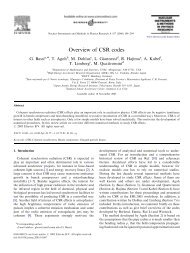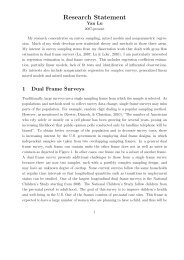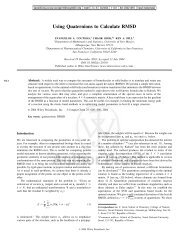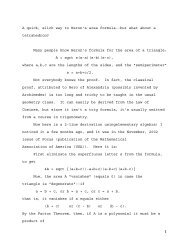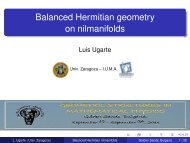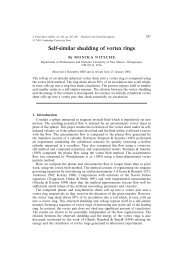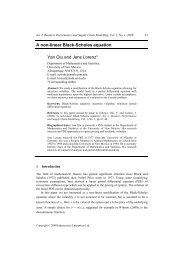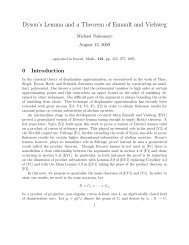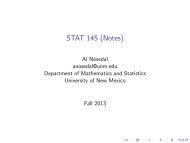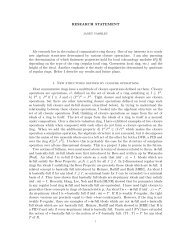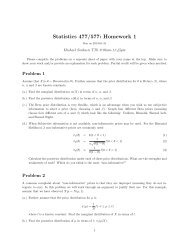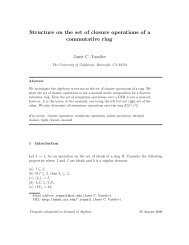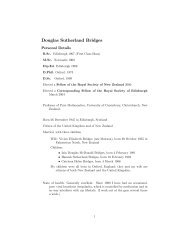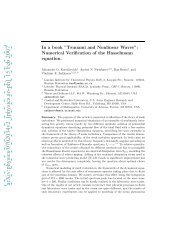OEO Office of Equal Opportunity - Department of Mathematics and ...
OEO Office of Equal Opportunity - Department of Mathematics and ...
OEO Office of Equal Opportunity - Department of Mathematics and ...
Create successful ePaper yourself
Turn your PDF publications into a flip-book with our unique Google optimized e-Paper software.
138 ARTS AND SCIENCES<br />
597. Individual Study-Master’s Degree. (1-3 to a maximum<br />
<strong>of</strong> 6) ∆<br />
599. Master’s Thesis. (1-6)<br />
Offered on a CR/NC basis only.<br />
600. Research Methods. (3)<br />
This seminar reviews: 1) archival <strong>and</strong> library research; 2)<br />
data collection <strong>and</strong> fieldwork (plus subsequent analysis <strong>and</strong><br />
presentation <strong>of</strong> data); 3) processes <strong>of</strong> hypotheses <strong>and</strong> theory<br />
building; <strong>and</strong> 4) development <strong>of</strong> a research proposal.<br />
Prerequisite: 500. {Spring}<br />
697. Individual Study. (1-3 to a maximum <strong>of</strong> 12) ∆<br />
For Ph.D. c<strong>and</strong>idates only.<br />
699. Dissertation. (3-12)<br />
Offered on a CR/NC basis only.<br />
Culture Studies<br />
303. Law in the Political Community. (3)<br />
(Also <strong>of</strong>fered as POLS 303.) Introduction to the role <strong>of</strong> law<br />
<strong>and</strong> legal institutions in politics <strong>and</strong> society.<br />
Prerequisite for POLS 315.<br />
308./508. Cultural Autobiography. (3)<br />
This course is concerned with meaning, identity <strong>and</strong> subject<br />
formation in the autobiographical text. Readings will focus<br />
on contemporary critical theory about autobiography <strong>and</strong><br />
post-colonial studies. Students will draw on a broad range<br />
<strong>of</strong> personal accounts that result from the construction <strong>of</strong><br />
race, gender, class <strong>and</strong> ethnicity in the United States past<br />
<strong>and</strong> present.<br />
309./509. Topics in Social Movements. (3 to a maximum<br />
<strong>of</strong> 6) ∆<br />
An interdisciplinary approach to the analysis <strong>of</strong> social movements,<br />
focusing on cultural <strong>and</strong> social formations <strong>of</strong> these<br />
movements. Topics include: folklore <strong>of</strong> social movements;<br />
labor struggles; peace movements; l<strong>and</strong> conflicts.<br />
310./510. Topics in Culture Studies. (3 to a maximum<br />
<strong>of</strong> 6) ∆<br />
Varying topics undergraduate course. An in-depth study <strong>of</strong><br />
one subject in the field <strong>of</strong> interdisciplinary culture studies.<br />
Topics may include material culture, folklore, consumerism,<br />
public culture, critical theory, cultural identity <strong>and</strong> language<br />
<strong>and</strong> representation.<br />
311./511. Material Culture in America. (3)<br />
(Also <strong>of</strong>fered as MSST 311/511.) This course covers the<br />
theory <strong>and</strong> practice <strong>of</strong> material culture study as it has been<br />
used to define American culture. Course content includes<br />
architecture, technology, religious art <strong>and</strong> artifacts, literary,<br />
folk <strong>and</strong> “fine” arts.<br />
312./512. War <strong>and</strong> American Culture. (3)<br />
Focusing on World War II <strong>and</strong> the Vietnam War, this course<br />
will analyze the “cultural construction” <strong>of</strong> war in 20th-century<br />
America. Topics include ideas <strong>of</strong> citizenship, gender <strong>and</strong><br />
race, popular culture, roles <strong>of</strong> media <strong>and</strong> government.<br />
313. American Folklore <strong>and</strong> Folklife. (3)<br />
An introduction to the informal, vernacular facets <strong>of</strong> American<br />
culture with a focus on the artistic <strong>and</strong> symbolic dimensions<br />
<strong>of</strong> daily life as expressed in oral traditions, folkloric events <strong>and</strong><br />
material culture. {Fall}<br />
315./515. Race, Class & Gender in the Culture Industry.<br />
(3)<br />
This course will focus on 20th century U.S. cultural history<br />
<strong>and</strong> cultural studies. Proceeding chronologically, the course<br />
integrates a range <strong>of</strong> cultural mediums to investigate the construction<br />
<strong>of</strong> social identity.<br />
317./517. Visual Culture. (3)<br />
This course will investigate the role <strong>of</strong> visual experience in<br />
everyday life. The assigned works represent a variety <strong>of</strong> interdisciplinary<br />
approaches to American visual culture, including<br />
photography, film, television, material culture, <strong>and</strong> public art.<br />
508./308. Cultural Autobiography. (3)<br />
This course is concerned with meaning, identity <strong>and</strong> subject<br />
formation in the autobiographical text. Readings will focus<br />
on contemporary critical theory about autobiography <strong>and</strong><br />
post-colonial studies. Students will draw on a broad range<br />
<strong>of</strong> personal accounts that result from the construction <strong>of</strong><br />
race, gender, class <strong>and</strong> ethnicity in the United States past<br />
<strong>and</strong> present.<br />
509./309. Topics in Social Movements. (3 to a maximum<br />
<strong>of</strong> 6)<br />
An interdisciplinary approach to the analysis <strong>of</strong> social movements,<br />
focusing on cultural <strong>and</strong> social formations <strong>of</strong> these<br />
movements. Topics include: folklore <strong>of</strong> social movements;<br />
labor struggles; peace movements; l<strong>and</strong> conflicts.<br />
510./310. Topics in Culture Studies. (3 to a maximum<br />
<strong>of</strong> 6) ∆<br />
An in-depth study <strong>of</strong> one subject in the field <strong>of</strong> interdisciplinary<br />
culture studies. Topics may include material culture, folklore,<br />
consumerism, public culture, critical theory, cultural identity<br />
<strong>and</strong> postcolonial studies.<br />
511./311. Material Culture in America. (3)<br />
(Also <strong>of</strong>fered as MSST 311/511.) This course covers the<br />
theory <strong>and</strong> practice <strong>of</strong> material culture study as it has been<br />
used to define American culture. Course content includes<br />
architecture, technology, religious art <strong>and</strong> artifacts, literary,<br />
folk <strong>and</strong> “fine” arts.<br />
512./312. War <strong>and</strong> American Culture. (3)<br />
Focusing on World War II <strong>and</strong> the Vietnam War, this course<br />
will analyze the “cultural construction” <strong>of</strong> war in 20th-century<br />
America. Topics include ideas <strong>of</strong> citizenship, gender <strong>and</strong><br />
race, popular culture, roles <strong>of</strong> media <strong>and</strong> government.<br />
513. Theories <strong>and</strong> Methods <strong>of</strong> Folklore Study. (3)<br />
This course examines key methods <strong>and</strong> theoretical<br />
approaches to the study <strong>of</strong> folklore, focusing on the artistic<br />
<strong>and</strong> symbolic dimensions <strong>of</strong> daily life as expressed in oral<br />
traditions, folkloric events <strong>and</strong> material culture.<br />
515./315. Race, Class & Gender in the Culture Industry.<br />
(3)<br />
This course will focus on 20th century U.S. cultural history<br />
<strong>and</strong> cultural studies. Proceeding chronologically, the course<br />
integrates a range <strong>of</strong> cultural mediums to investigate the construction<br />
<strong>of</strong> social identity.<br />
516. Language <strong>and</strong> Cultural Representation. (3)<br />
An intensive study <strong>of</strong> various contemporary theories about<br />
the intersection <strong>of</strong> language <strong>and</strong> culture. Readings focus on<br />
the interdisciplinary study <strong>of</strong> language, drawing especially on<br />
postmodern theory.<br />
517./317. Visual Culture. (3)<br />
This course will investigate the role <strong>of</strong> visual experience in<br />
everyday life. The assigned works represent a variety <strong>of</strong> interdisciplinary<br />
approaches to American visual culture, including<br />
photography, film, television, material culture, <strong>and</strong> public art.<br />
518. Post-Colonial Theory. (3)<br />
This is a graduate-level introduction to the interdisciplinary<br />
field <strong>of</strong> post-colonialism. The readings will cover areas in<br />
post-structuralism, post-modernism, semiotics, discourse<br />
analysis, textuality, Western Marxism, cultural nationalism,<br />
colonialism(s) <strong>and</strong> imperialism.<br />
519. Topics in Cultural History. (3 to a maximum <strong>of</strong> 6) ∆<br />
Graduate seminars; content varies. Topics include: democracy,<br />
culture <strong>and</strong> history; American l<strong>and</strong>scapes; history <strong>and</strong><br />
narrative.<br />
Environment, Science, Technology<br />
182. Introduction to Environment, Science <strong>and</strong><br />
Technology. (3)<br />
An introduction to the socially <strong>and</strong> politically constructed values<br />
directing Americans’ attitudes toward nature, science <strong>and</strong><br />
UNM CATALOG 2006–2007 Symbols, page 611.



